UPDATE: Tanisha Sullivan lost to Bill Galvin, who will now face Republican Rayla Campbell. Sullivan told Boston.com: “Our campaign may be ending today, but our work to protect our democracy — to strengthen our communities — continues.”
Ask Tanisha Sullivan why she’s running for secretary of state of Massachusetts, and the civil rights leader jumps into her assessment of barriers to the commonwealth’s voting accessibility: There are wide voter turnout gaps between communities. A more expansive vote-by-mail program was only implemented following the COVID-19 pandemic. And same-day voter registration remains an elusive policy despite most New England states having some form of it.
Sullivan, an attorney and president of the Boston chapter of the NAACP, thinks the secretary of state’s office could up its game when it comes to elections. And Sullivan, who, if elected, would be the first woman and person of color in the role, wants to lead the charge.
“As other states are fighting to protect against voter suppression, there is no reason why Massachusetts cannot be on the other end, fighting and pushing to advance our democracy,” Sullivan, 48, told The 19th. “Because we need both: protection and advancement.”
But first, Sullivan, a first-time candidate, must defeat Bill Galvin, the 71-year-old Democratic incumbent who has served as secretary of state since the mid-1990s. The two are on the ballot for their party’s primary on Tuesday.
Republican Rayla Campbell is also running for the seat, but whoever wins the Democratic nomination is heavily favored to win in November. Campbell, a Black woman, is part of a cohort of GOP candidates for secretary of state who have claimed falsely that the 2020 election was rigged.
Sullivan and Campbell are among several women of color running for secretary of state around the country, though their proposals vary greatly. In Michigan, Republican Kristina Karamo, another Black woman, is challenging Democratic Secretary of State Jocelyn Benson on a platform that includes conspiracy theories about the state’s elections.
Glynda Carr, president and chief executive of Higher Heights, which backs Black women as candidates and engages them as voters and donors, sees a significance in Black women who are trying to uphold democracy by overseeing elections. Carr’s group has endorsed Sullivan and Democratic state lawmaker Stephanie Thomas’ bid for secretary of state in Connecticut.
“I think we’re going to see more Tanisha Sullivans across this country, who are local leaders in institutions like NAACP, who are taking their activism around voting rights to elected office,” she said.
Tolulope Kevin Olasanoye is political director of the Collective PAC, which raises money and support for Black candidates around the country and has endorsed Sullivan. The primary challenge from Sullivan, he said, emphasizes the importance of making a secretary of state’s office work for all of the electorate.
“I think the question is, beyond the historic symbolism of having the first Black woman being secretary of state, how do we have substantive conversations about starting to eliminate systemic barriers to entry for marginalized communities?” he said. “I think Tanisha brings a very thoughtful, lived-experience approach to that conversation.”
Sullivan said she’s cognizant of how she could bring new perspectives and ideas to the office, which include further expanding automatic voter registration and better working with marginalized communities to increase voter participation. She said separate from her ideas on expanding voting access, she wants to explore ways the secretary of state could support other policies. Following the decision on Dobbs v. Jackson Women’s Health Organization, the Supreme Court ruling that overturned federal abortion rights, she announced support for restricting public access to the home addresses of abortion providers to ensure their safety.
“When Dobbs was handed down, it wasn’t enough for me to continue to say, ‘I am a champion for reproductive justice.’ I wanted to try to figure out a way that this office could play a role in helping to protect abortion access,” she said.

Recent polling of the race shows Galvin’s lead over Sullivan has increased 11 points since June (20 percent of poll respondents remain undecided). But Sullivan believes it’s hard to capture the momentum she’s building statewide, which included winning her party’s endorsement over Galvin at a key convention over the summer.
“You cannot poll transformation,” she said. “You cannot poll the experiences of people in our community who have not been inspired to vote until right now, in this race.”
Part of Sullivan’s pitch has been linking Galvin to what she describes as shortcomings to Massachusetts’ voter outreach and engagement.
“[Massachusetts is] not a leader when it comes to voting rights because we have a secretary of state who does not believe that it is the responsibility of the secretary of state’s office to break down all barriers to the ballot box,” she said.
Galvin has defended his handling of the job. During a debate last month, he expressed support for several policies backed by Sullivan, including same-day voter registration (a bill in the legislature has stalled). He also touted his implementation of vote-by-mail and early voting that led to record voter turnout in 2020. Galvin said any low voter turnout in some communities can be tied to limited interest in certain races.
“I do think it is important that we reach out to get people to vote, but we’ve done that,” he said.
Sullivan has also criticized Galvin’s role in a 2016 lawsuit that challenged the state’s then 20-day voter registration cutoff law. Galvin, who was named in the lawsuit, appealed an initial ruling in the case that determined the law was unconstitutional. (The law was later upheld.) Galvin said his actions were due to concerns about administrative logistics but that even then he supported same-day voter registration.
Galvin has emphasized the importance of having a secretary of state with technical experience ahead of the 2024 presidential election, given Republican-led efforts to restrict access to the ballot.
“It’s extremely important we have somebody that knows about elections, knows how to run elections, and could speak to the national issues as the senior Democratic elected official,” he said at the debate.

Sullivan said she knows there is a lot of attention on other secretary of state races ahead of the midterm election. But she hopes Massachusetts voters will see a compelling argument for shaking up leadership in the office.
“I believe that we run the risk of finding ourselves in a situation where we are so focused on the states where we’ve got to fight back, that we may find ourselves in a situation where we realize we’re not even advancing,” she said.







